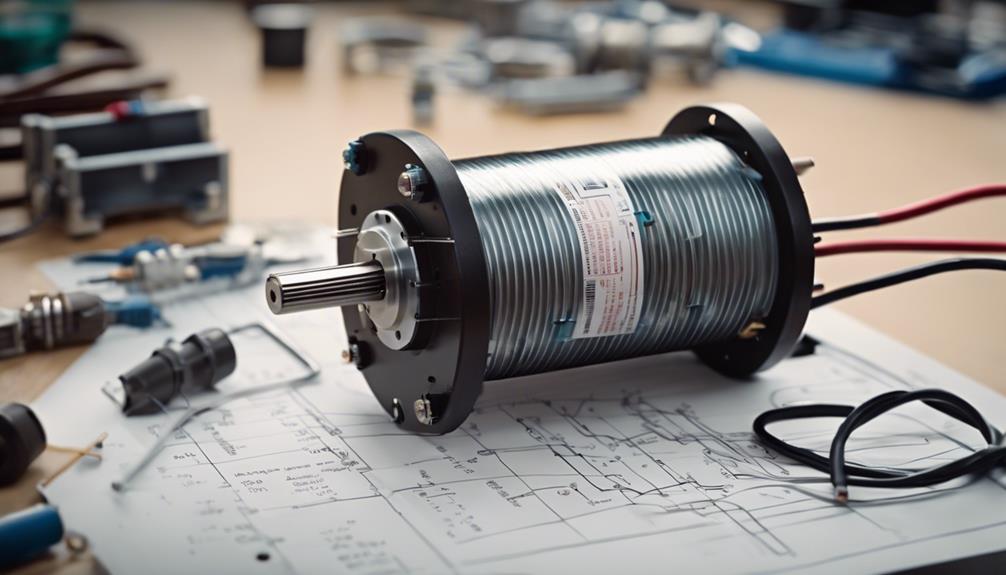Submit Your Request
Please fill out the form below.
Please fill out the form below.
Need a custom solution?

Did you know that DC motors are widely used in various industries due to their efficiency levels reaching up to 90%? Understanding how to optimize performance and efficiency can lead to significant cost savings and improved outcomes.
From analyzing efficiency metrics to implementing optimization strategies, the world of DC motor efficiency and performance is multifaceted. Explore the intricacies of factors influencing efficiency and discover techniques to enhance performance for optimal results.
When evaluating DC motor efficiency, it’s crucial to consider both electrical and mechanical losses to accurately assess performance. Motor design plays a significant role in determining these losses. Efficient motor designs aim to minimize copper and iron losses by using high-quality materials and optimizing the winding configuration.
Additionally, reducing friction and windage losses through proper bearing selection and lubrication is essential for improving overall efficiency.
Thermal management is another critical aspect that directly impacts the efficiency of a DC motor. Heat generated during operation can lead to performance degradation and even permanent damage if not managed effectively. Proper thermal design, including adequate ventilation, heat sinks, and possibly active cooling systems, is vital to ensure that the motor operates within safe temperature limits.
To evaluate DC motor performance metrics effectively, one must analyze key indicators such as speed, torque, efficiency, and power output. Speed, measured in revolutions per minute (RPM), indicates how fast the motor can operate under different loads. Torque output, expressed in Newton-meters (Nm), signifies the rotational force the motor can generate.
Efficiency is a crucial metric representing how well the motor converts electrical energy into mechanical power without losses. Power output, measured in watts (W), quantifies the amount of work the motor can perform in a given time. Power consumption, a critical consideration, reflects the electrical energy drawn by the motor during operation.
Evaluating these metrics collectively provides a comprehensive understanding of the motor’s performance capabilities. High torque output coupled with efficient power consumption can indicate a robust motor suitable for demanding applications. Analyzing speed, torque, efficiency, power output, and power consumption allows for informed decisions regarding the motor’s suitability for specific tasks.
As you aim to enhance DC motor efficiency and performance, delving into optimization strategies offers a pathway to maximize operational effectiveness and output quality. When focusing on optimization strategies, consider the following key points:
Efficiency in DC motors is significantly influenced by a combination of factors ranging from design considerations to operational parameters. When it comes to motor design, the efficiency of a DC motor is heavily dependent on the materials used for the core and windings, as well as the overall construction of the motor. Higher quality materials and precise engineering can lead to lower energy losses and higher efficiency. Additionally, the size and weight of the motor can impact its efficiency, with smaller and lighter motors often being more efficient due to reduced friction and inertia.
Power consumption is another critical factor affecting the efficiency of DC motors. The efficiency of a motor decreases as power consumption increases, highlighting the importance of optimizing operational parameters such as load, speed, and voltage. By carefully controlling these parameters, you can improve the overall efficiency of the motor and reduce energy wastage. Understanding how motor design and power consumption influence efficiency is crucial for maximizing the performance of DC motors in various applications.
Implementing advanced control algorithms can significantly enhance the performance of DC motors in terms of speed regulation and torque output. To optimize the performance of a DC motor, consider the following enhancement techniques:
To maintain long-term efficiency and performance of DC motors, you should conduct regular maintenance checks and prioritize insulation checks. These practices help identify issues early, ensuring optimal functionality and extending the motor’s lifespan.
Influence of environmental conditions on dc motors’ efficiency and performance is significant. Temperature regulation is critical for optimal operation. Humidity control ensures longevity. Implementing strategies for efficiency optimization in varied environments is key to sustained motor functionality.
When operating DC motors for optimal efficiency and performance, safety precautions such as proper grounding and insulation must be followed. Voltage regulation is critical to prevent overheating and ensure stable operation.
When looking to enhance overall efficiency and performance by integrating renewable energy sources, consider combining DC motors with power generation optimization techniques. This synergy can lead to significant improvements in sustainability and operational effectiveness.
Advancements in technology, like IoT and AI, significantly impact DC motor optimization. They offer precise data collection, real-time adjustments, and predictive maintenance. These tools enhance efficiency, performance, and reliability, making optimization strategies more effective and adaptable.
You have now gained a deeper understanding of DC motor efficiency and performance. By analyzing efficiency and evaluating performance metrics, you can optimize strategies to enhance the motor’s overall performance.
Factors influencing efficiency must be carefully considered, and implementing enhancing techniques can lead to significant improvements.
By continuously monitoring and adjusting these aspects, you can ensure that your DC motor operates at its highest level of efficiency and performance.